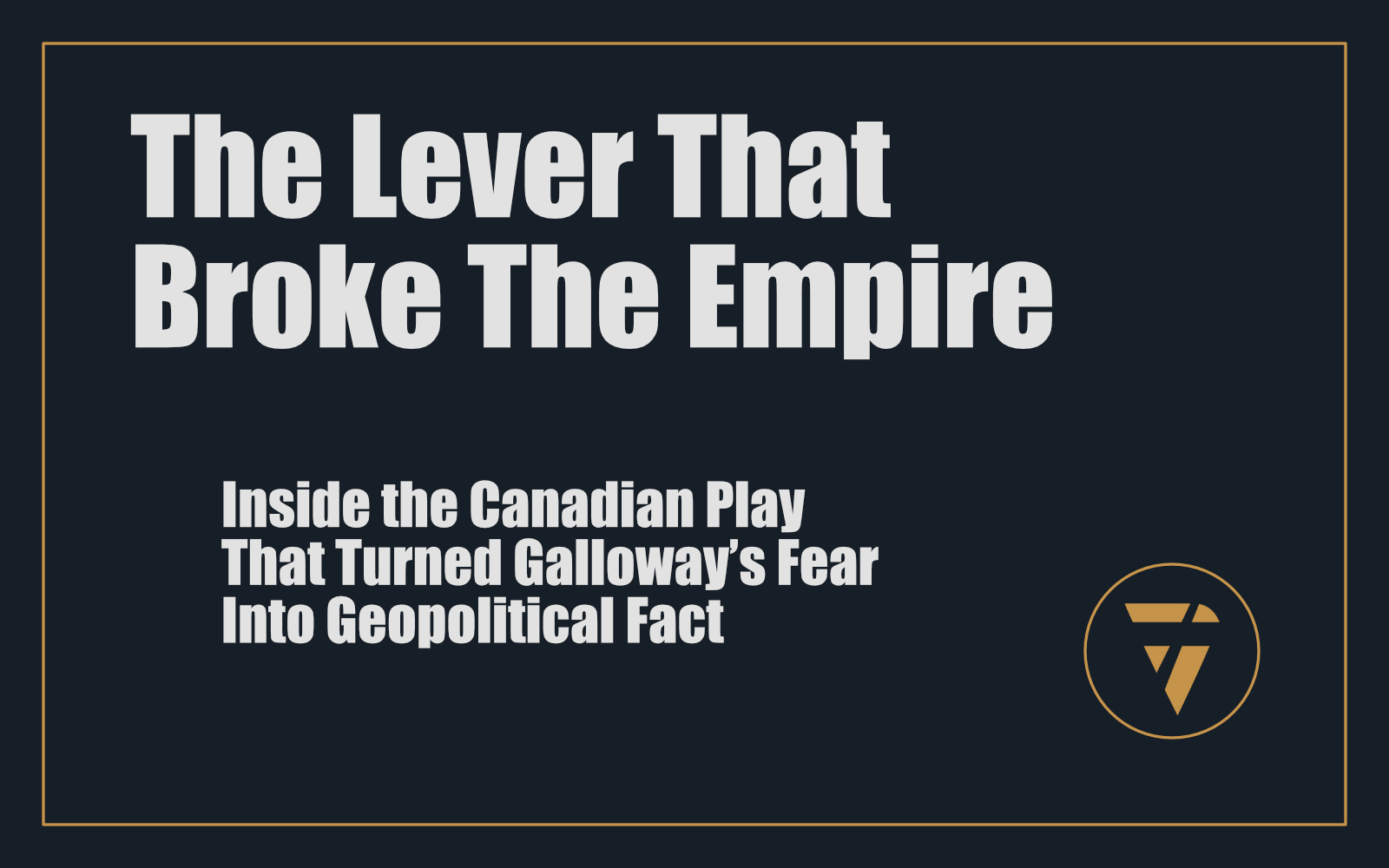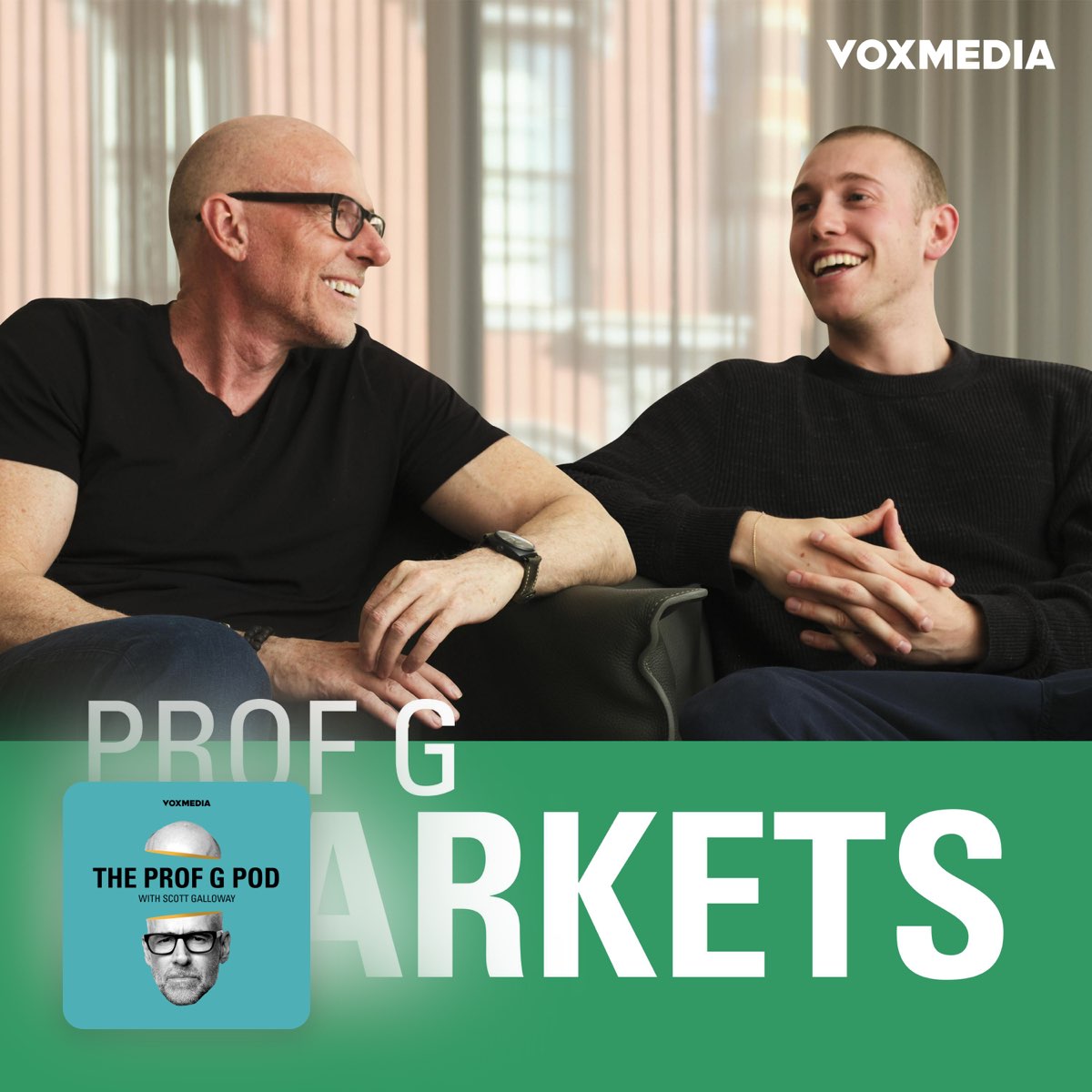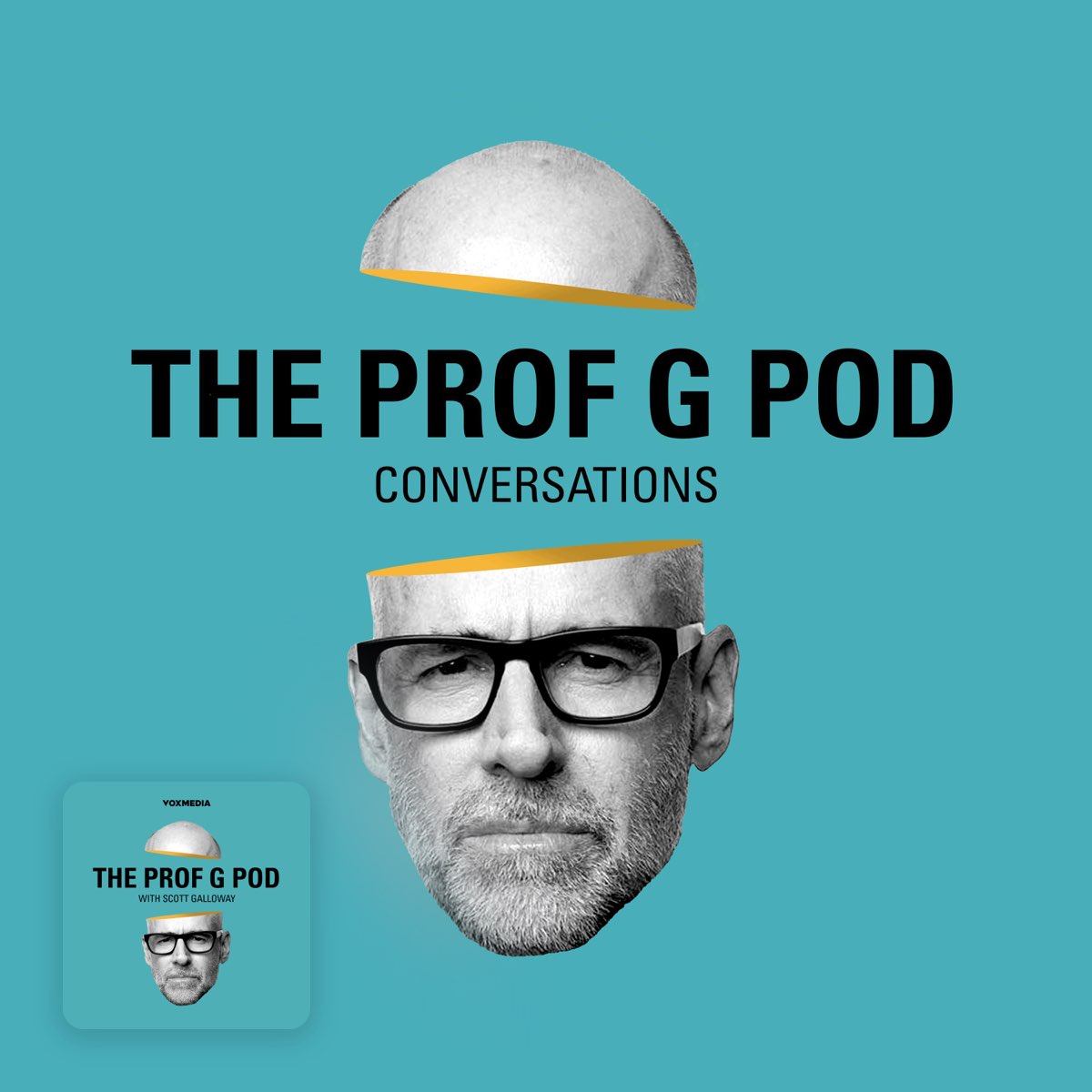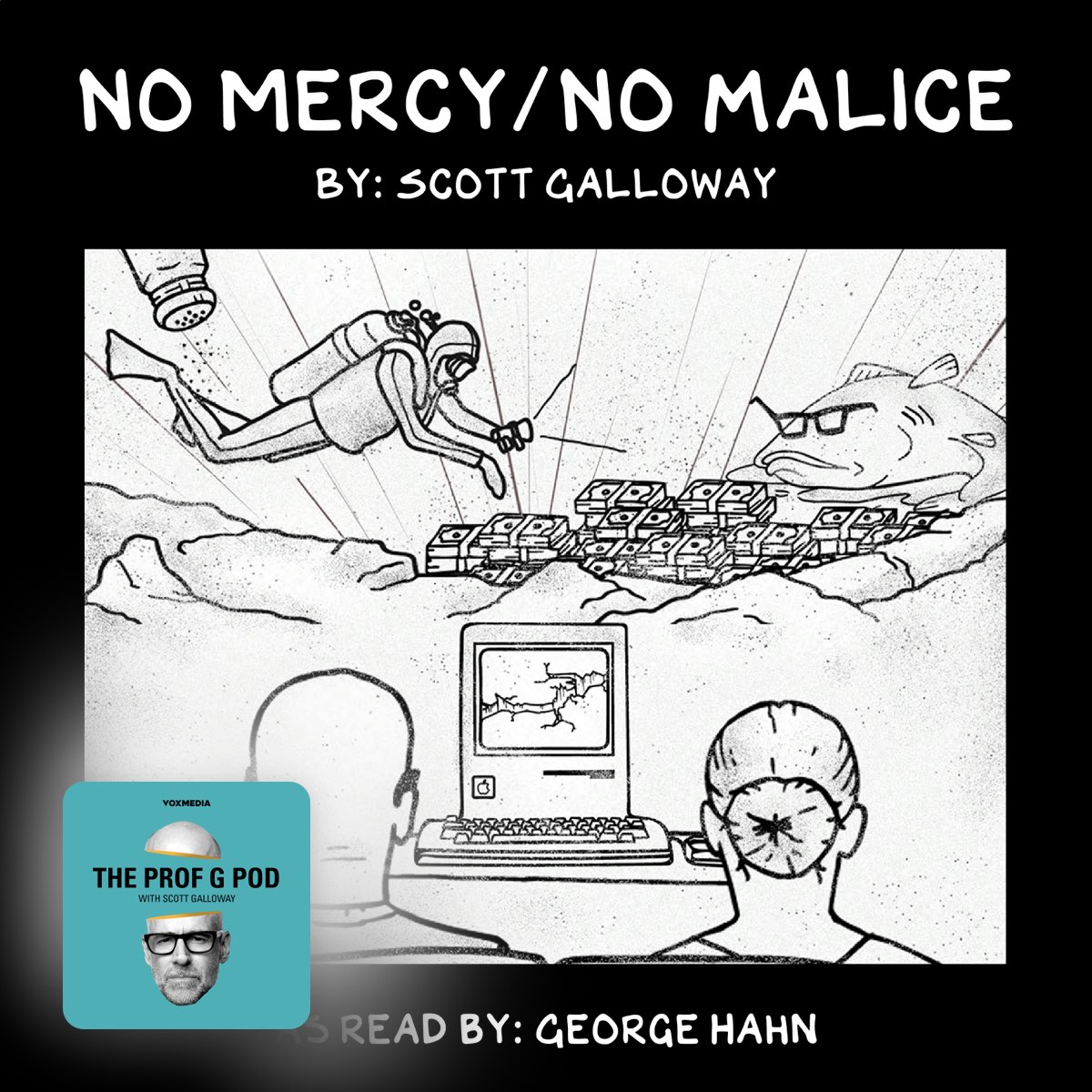The Lever That Broke The Empire

Inside the Canadian Play That Turned Galloway’s Fear Into Geopolitical Fact
There’s a moment in every empire’s story when the façade fractures. Not from invasion. Not from rebellion. But from a quiet, strategic unmaking of belief.
That moment just happened. And the hands that pulled the lever weren’t Chinese, Russian, or insurgent. They were Canadian. Steady. Intentional. Surgical.
Scott Galloway has been warning about this for months. In every studio chair, in every podcast booth, he hammered the same line: the greatest threat to American power isn’t cultural decay, political division, or even military overstretch... it’s the bond market. He's been telling anyone who will listen for the last week...





Now the truth has caught up with the warning.
Everything Galloway feared has been activated. Every vulnerability he named has been weaponised. But not by Wall Street. Not by Beijing.
By Ottawa. By Carney.
Let me walk you through it.
This one was described in review as "A thought-provoking geopolitical thriller, not yet a verified reality." :)
I. Galloway’s Alarm: A System Designed to Snap
Before we name the play, we have to understand the board.
Scott Galloway — NYU professor, strategist, investor — has spent the last year laying bare the fragility of the U.S. fiscal structure. His message was simple:
America isn’t rich. It’s leveraged.
$34 trillion in debt. Annual deficits larger than many countries’ entire GDP. A Treasury addicted to cheap money, constantly rolling over IOUs in the form of bonds. All of it balanced on the belief that someone will always buy.
This was his warning: if the rest of the world stops believing in the safety of U.S. Treasury bonds, the whole system unravels. Interest rates spike. The dollar weakens. Borrowing costs balloon. Markets collapse under the weight of sovereign fragility.
It wouldn’t take a crash. It would only take a slow bleed... the gentle withdrawal of faith from the system that props up the empire.
That’s what Galloway saw.
That’s what Carney built.
II. The Setup: Canada’s Conversion from Dependent to Dominant
Mark Carney didn’t just inherit a country. He inherited a doctrine, one that had long held that Canada was a follower, not a force. A dependable G7 sidekick. A quiet northern neighbour.
He killed that doctrine in six moves:
- Treasury Expansion as Camouflage
Carney’s administration subtly increased Canada’s holdings of U.S. Treasuries to over $350 billion. To the untrained eye, it looked like a defensive hedge — a smart, conservative move. - Diplomatic Quietude
While Trump escalated tariffs, Carney didn’t retaliate publicly. He travelled. Met with European and Japanese financial leaders. Quiet rooms. No press. Every conversation aimed at one thing: alignment of bond strategy. - USD-Denominated Canadian Bonds
In March 2025, Canada issued a $3.5 billion bond — not in CAD, but in U.S. dollars. It was brilliant. It didn’t just attract international capital. It offered investors a safe haven alternative to U.S. Treasuries. Same currency. More trust. - Coordinated Whisper Campaign
Tokyo. Berlin. Paris. Amsterdam. Behind every door, Carney repeated the same logic: if Trump accelerates economic aggression, we answer not with tariffs — but with liquidity starvation. No panic. Just attrition. - Trigger Point Installation
At the first sign of U.S. belligerence, the plan was activated: coordinated tapering of Treasury reinvestments. Not mass selling — that’s noisy. This was surgical non-renewal. Let bonds mature. Don’t replace. Starve the auction. - Message Delivery
Last week, Carney called Trump. No leaks. No transcript. But the result? Trump froze all Canadian and EU tariffs within 24 hours. Not because of pressure — because of fear. He saw the board, and realised it wasn’t his anymore.
III. The Mechanism: Monetary Mutually Assured Disruption
This is not theory. It’s doctrine.
The U.S. bond market is the world’s largest reservoir of sovereign debt. Over $8.5 trillion is held by foreign governments. Why? Because it’s been the most stable instrument on Earth.
But stability is not static. It’s a belief system.
Here’s what happens when major bondholders begin to taper:
- Bond Supply Increases: Fewer buyers means more debt remains unsold.
- Prices Fall, Yields Rise: To attract investors, the U.S. has to offer higher interest rates.
- Debt Service Costs Balloon: Every 1% increase in yields adds hundreds of billions to U.S. borrowing costs.
- Currency Weakens: The dollar, long buoyed by bond demand, begins to slide.
- Market Confidence Craters: Equity markets correlate with interest rate expectations. As yields spike, valuations collapse.
This isn’t just economic attrition. It’s bond-based brinkmanship. And it gives Canada — and its allies — monetary first-strike capability without ever firing a shot.
IV. Galloway’s Lens: Seeing It Before It Was Named
Listen to Galloway’s interviews from the last ten days. The pattern is there:
- “There is no nation on Earth more vulnerable to a loss of investor confidence than the United States.”
- “Our biggest export is debt, not tech.”
- “The dollar is strong because the world still trusts us. The moment they don’t — everything changes.”
He didn’t name Canada.
But now you will.
Everything Galloway feared — the erosion of trust, the revaluation of risk, the geopolitical fracturing of financial alignment — is now traceable to a single, quiet trigger: Canada’s bond play.
This wasn’t defiance. It was direction. And now that the motion has begun, it will not stop.
V. The New Doctrine: Monetary Sovereignty as Global Leverage
The playbook has changed.
For decades, global power was measured by tanks, treaties, or GDP. No longer. In 2025, the new doctrine is simple:
He who controls the bond market controls the empire.
Mark Carney has quietly installed a new economic operating system:
- Alternative liquidity corridors through USD-denominated Canadian paper
- Allied reinvestment pacts that reduce U.S. debt recycling
- Narrative reconfiguration: Canada as a credible issuer, not just a buyer
This isn’t a cycle. It’s a transition.
From American centrality to Canadian consequence.
From economic dependence to fiscal deterrence.
From theory to weaponised liquidity.
VI. Consequences: What Comes Now
This is not a stunt. It’s not a moment. It’s a structural shift. And here’s what it triggers:
- Permanent Repricing of U.S. Risk
Markets will begin to factor in geopolitical bond instability — for the first time in 80 years. - Rise of Multipolar Bond Issuers
Canada, Japan, and the EU now form a counterbalance bloc. The dollar’s dominance faces disciplined erosion. - Capital Realignment
Institutional investors will start hedging with non-U.S. sovereigns — and Canadian USD paper becomes premium. - Strategic Obsolescence of U.S. Threats
Trump’s tariffs are irrelevant now. Any aggression can be met with quiet tapering. The gun is no longer in his hand. - G7 Realignment
Canada now seats itself not as junior partner, but as strategic pivot. The nation that broke the cycle of American economic absolutism.
VII. Final Word: The Empire Just Flinched
You want to know how empires collapse? They don’t burn. They blink.
Trump blinked.
Because Carney didn’t flinch. He didn’t flex. He didn’t threaten. He installed a system that could end an empire’s illusion of control — without making a sound.
Scott Galloway saw the threat.
Mark Carney became it.
And now the world sees who actually commands the consequence.
Canada just rewrote the doctrine of deterrence.
And if you’re still asking whether this was real — check the U.S. bond market today.
Check the yield curve.
Check the dollar index.
Then ask yourself this:
Who really holds the cards?
Because for the first time in a century… it’s not the United States.
It’s the architect who moved in silence.
And it’s the country that follows him.
Canada.
This is what I’m working on. Tell me what you think, I enjoy the conversation! Subscribe and follow the work in real time.
Thanks!
B

The empire didn’t fall. It was unwound... one Treasury bond at a time.
Galloway saw the cliff. Carney built the path to it.
The dollar isn’t collapsing. It’s being quietly evicted.
PS -











